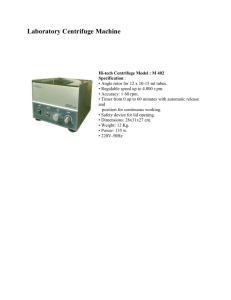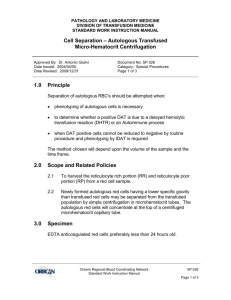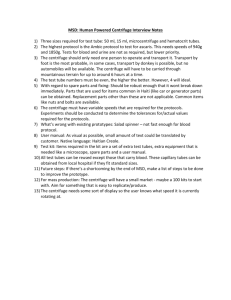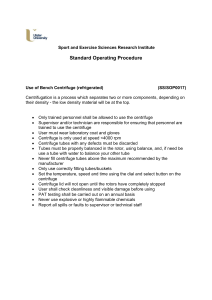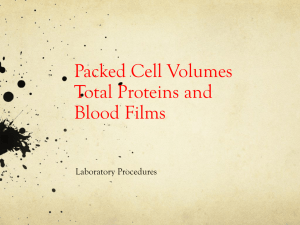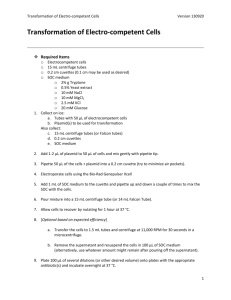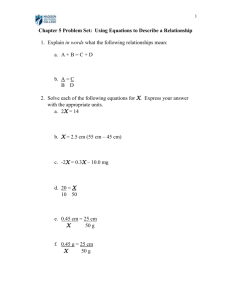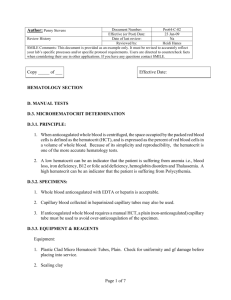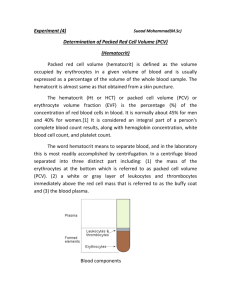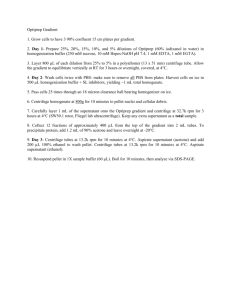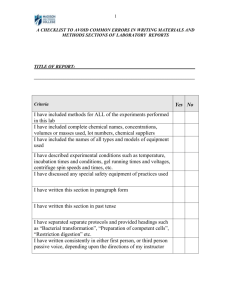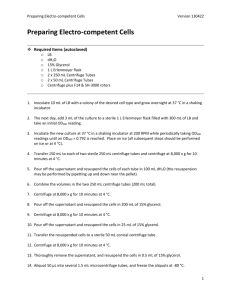Maximum Packing of Microhematocrits SOP
advertisement
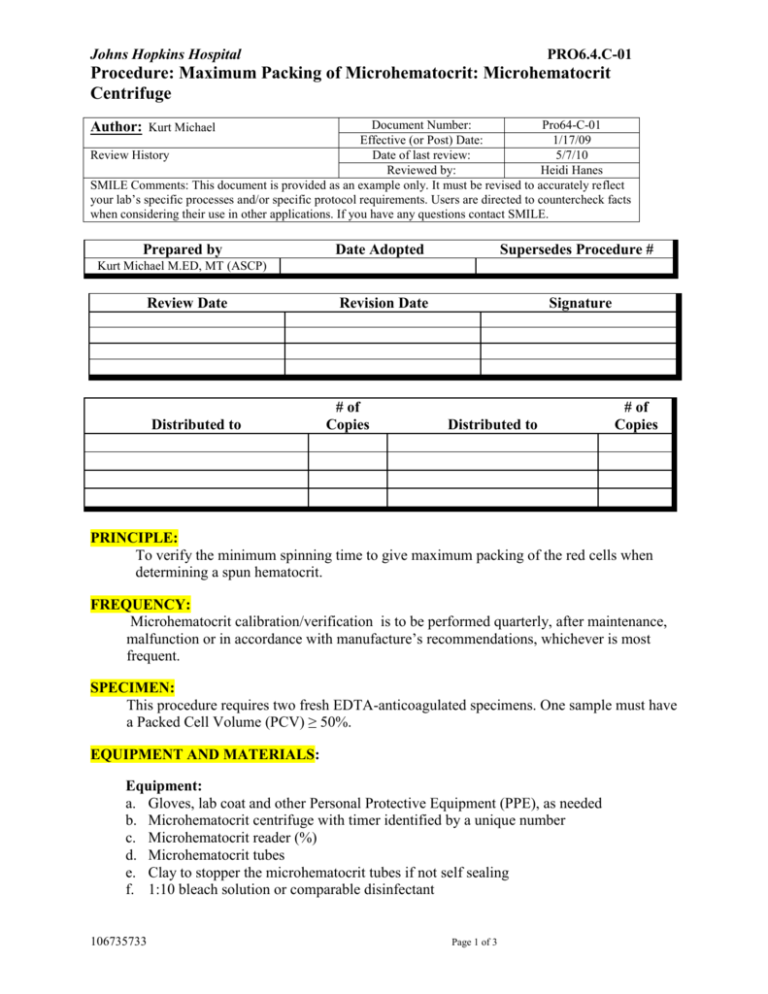
Johns Hopkins Hospital PRO6.4.C-01 Procedure: Maximum Packing of Microhematocrit: Microhematocrit Centrifuge Document Number: Pro64-C-01 Effective (or Post) Date: 1/17/09 Review History Date of last review: 5/7/10 Reviewed by: Heidi Hanes SMILE Comments: This document is provided as an example only. It must be revised to accurately reflect your lab’s specific processes and/or specific protocol requirements. Users are directed to countercheck facts when considering their use in other applications. If you have any questions contact SMILE. Author: Kurt Michael Prepared by Date Adopted Supersedes Procedure # Revision Date Signature Kurt Michael M.ED, MT (ASCP) Review Date Distributed to # of Copies Distributed to # of Copies PRINCIPLE: To verify the minimum spinning time to give maximum packing of the red cells when determining a spun hematocrit. FREQUENCY: Microhematocrit calibration/verification is to be performed quarterly, after maintenance, malfunction or in accordance with manufacture’s recommendations, whichever is most frequent. SPECIMEN: This procedure requires two fresh EDTA-anticoagulated specimens. One sample must have a Packed Cell Volume (PCV) ≥ 50%. EQUIPMENT AND MATERIALS: Equipment: a. Gloves, lab coat and other Personal Protective Equipment (PPE), as needed b. Microhematocrit centrifuge with timer identified by a unique number c. Microhematocrit reader (%) d. Microhematocrit tubes e. Clay to stopper the microhematocrit tubes if not self sealing f. 1:10 bleach solution or comparable disinfectant 106735733 Page 1 of 3 Johns Hopkins Hospital PRO6.4.C-01 Procedure: Maximum Packing of Microhematocrit: Microhematocrit Centrifuge g. Absorbent tissues or guaze h. Spare rubber bumber if needed for centrifuge Documents: Maximum Packing of Microhematocrit work sheet – Record the unique microcentrifuge number, four readings on each of two samples at 30 second intervals beginning at 2 minutes and up to 5 minutes, room to write date and performing technologist’s initials. (See appendix I for an example) CALIBRATION: If the manufacturer has specified a fixed speed for the centrifuge, then this can be verified using the centrifuge calibration/verification procedure number Cal/Ver 102. The timer can also be verified by using the same procedure. Either rotation speed or timer variance can be accommodated by determining maximum packing times. However, maintenance of the centrifuge and timer should be scheduled. PROCEDURE - STEPWISE: 1. Handle all specimens wearing a lab coat, gloves and any other personal protection equipement as needed. 2. Mix the two tubes of EDTA-anticoagulated blood completely. 3. Fill two mirohematocrit tubes from each EDTA blood tube to approximately 70-80% volume of tube. Total of four tubes. Keep tubes from one sample separate from the other. 4. Stopper the tubes with clay, if necessary, and use a tissue to wipe excess blood from the microhematocrit tubes. 5. Fill a set of four tubes from each spin time; 2, 2.5, 3, 3.5, 4, 4.5, 5 minutes. Total 28 tubes, 14 from each sample. 6. Load and balance the first set of four microhematocrit centrifuge tubes, keeping the two samples on opposite sides of the centrifuge. Note the numbers of the load positions of sample #1 on the record sheet so the two samples are identifiable. 7. Close the cover and spin for 2 minutes. 8. When the centrifuge comes to a complete stop, remove the samples and read the % PCV. Record the percent PVC for each of the four of tubes on the worksheet on the line corresponding to the spin time. 9. Continue increasing the spin time by 30 seconds until the PCV has remained at the same value for two consecutive time series. The minimum spinning time to give maximum packing of the red cells is the second time interval giving a constant % PCV. ACCEPTABLE CRITERIA: 1. The minimum spinning time to give maximum packing of red cells must be less than five minutes. If NOT perform checks on rotation speed, timer verification and request maintenance as indicated. 2. If a the spun microhematocrit can be compared to another instrument, they should match within ± 2 %. 106735733 Page 2 of 3 Johns Hopkins Hospital PRO6.4.C-01 Procedure: Maximum Packing of Microhematocrit: Microhematocrit Centrifuge RECORDING RESULTS: 1. Make sure all necessary fields are completed on the Maximum Packing of Microhematocrit worksheet. 2. Attach a label to the microcentrifuge with the minimum spinning time to give maximum packing of red cells, the date and the technologist’s initials. NOTES: 1. Before and after the packing procedure clean the microcentrifuge with tissue or guaze and a 1:10 bleach solution or other comparable disinfectant. 2. Replace the rubber bumper of the microcentrifuge sample platform, as needed. REFERENCES: 1. The Johns Hopkins Hospital CoreLab Procedure Notebook, Department of Pathology, division of Clinical Chemistry, 2001, Johns Hopkins Hospital 2. CLSI (NCCLS), Clinical Laboratory Technical Procedure Manuals; Approved Guideline---Fourth Addition, GP2-A4, Vol. 22 No. 5. 3. Joint Commission on Accreditation of Healthcare Organizations, How to Meet the Most Frequently Cited Laboratory Standards, 1996, Oakbrook Terrace, IL. APPENDIXES: Appendix I – Example of Maximum Packing of Microhematocrits Record Sheet 106735733 Page 3 of 3
